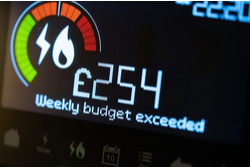 According to data from the Federation of Small Businesses (FSB), SMEs have experienced a 424% rise in gas costs and a 349% rise in electricity costs between February 2021 and 2022.
According to data from the Federation of Small Businesses (FSB), SMEs have experienced a 424% rise in gas costs and a 349% rise in electricity costs between February 2021 and 2022.
Continuing high energy prices have fed into the UK’s annual inflation rate hitting a 41-year-high of 11.1%
These spiralling costs are putting a significant strain on business with the FSB’s evidence that 96% of small businesses in the UK are concerned about rising energy costs and their knock-on effects. For many, those costs will threaten their very survival.
While a combination of interventions will be required, and the Energy Bill Relief Scheme (EBRS) for non-domestic customers will help, improved energy efficiency could further minimize the damage.
What about the environment?
With business responsible for a quarter of the UK’s greenhouse gas emissions, improving energy efficiency also comes with environmental benefits. While net zero may not feel like the immediate priority for those businesses simply looking to survive the winter, progress towards 2050 targets can be made while also pursuing cost savings.
So, what can businesses do to become more energy efficient, and what does this mean for bills and net zero goals?
What’s the business case for greater energy efficiency?
According to recent data from NatWest, 30% of businesses report that 11-20% of their total business costs go towards energy consumption. A further 22% report that energy represents a hefty 21-34% of costs. This was before the recent massive hike in energy bills.
With energy bills likely to stay high for the foreseeable future, it is no surprise that 70% of small business owners think that their ability to grow has been hampered by energy costs. But despite this, the think tank Green Alliance says that improvements in energy efficiency have flatlined in recent years.
What measures can businesses take to become more energy efficient?
For most businesses, the biggest energy wastage comes from the obvious sources: lighting, heating, and computer appliances. While power for these things can often feel like an unchanging and inevitable cost, technology like smart meters, low wattage bulbs and responsive lighting can help to reduce bills dramatically. According to the Green Alliance, this kind of low capital investment could help businesses cut energy use by up to 17%.
New technology like smart sensors within buildings have also proven particularly successful in helping businesses fine tune energy consumption.
For example, US software company BuildingIQ has developed a system for businesses to reduce energy use through the use of IoT sensors, wireless controlled pumps and motors, and advanced algorithms. The company has used its technology to reduce energy consumption by 4.8% in a shopping mall, 12% at a hospital, and 17% at a University. This demonstrates the major possibilities offered by smart optimisation.
Role of employees in cutting energy costs
However, it’s not just smart technology that can deliver energy efficiency. Employee actions can also make a huge difference. For example, a monitor left on for 24hrs can cost £50 a year in electricity. Educating staff on the importance of making minor changes to their habits – from turning computers and lights off at the end of the day to not overfilling a kettle – can significantly reduce energy consumption.
Lack of maintenance can significantly increase the energy an appliance takes to run. For example, clogged air filters on an air conditioning unit can result in 15% more energy usage. Routine inspections and maintenance can also significantly reduce an organisation’s electricity bills and carbon footprint.
How can standards contribute to energy efficiency?
There are many ways organisations can achieve energy efficiency, however without a clear strategy or process, effectively implementing measures can seem like a daunting challenge.
BS ISO 50005:2021 has been developed to help organisations initiate and improve energy management practices through a phased implementation of an energy management system. This allows organisations of all sizes to: determine the scope of implementation, decide on the elements to target, deliver simple and/or low-cost energy performance, and much more.
By following the steps set out, businesses will be able to lower energy bills while also working towards climate and sustainability goals. Thanks to a sponsorship by the Department for Business, Energy and Industrial Strategy (BEIS), the first 100,000 copies of the standard are available for free to SMEs. Get yours here now.
If you have any other questions about how particular standards can help your business improve its energy efficiency, BSI members can get in touch with the Knowledge Centre’s information experts.

 According to data from the Federation of Small Businesses (FSB), SMEs have experienced a
According to data from the Federation of Small Businesses (FSB), SMEs have experienced a 